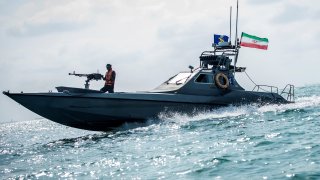
Over the last decade, Iran has been causing more and more headaches for oil tanker operators in the Strait of Hormuz, a central artery of global trade. In the last two years alone, Iran has harassed, attacked or interfered with 15 internationally flagged merchant vessels.
This critical waterway separates the Persian Gulf from the Arabian Sea, which makes it an important conduit for millions of barrels of oil that flow through the region.
"These tanker seizures, whether this is a sheer coincidence or not, is happening around the time that we have just passed the five-year anniversary of the Trump administration withdrawing from the nuclear deal," said Arona Baigal, research assistant for the Middle East Security Program at the Center for a New American Security.
In the most recent incidents, Iran alleges that the tankers Niovi and Purity were seized over separate legal disputes regarding ownership, and that the Advantage Sweet was taken due to a collision with an Iranian ship.
We've got the news you need to know to start your day. Sign up for the First & 4Most morning newsletter — delivered to your inbox daily. >Sign up here.
In response to Iranian ship seizures, the U.S. Navy's Fifth Fleet, which is responsible for security in the region, announced an increase in patrols. That included the guided-missile destroyer USS Paul Hamilton transiting the strait in late May.
"When you do beef up your presence, you increase your size as a target," said Victoria Coates, a senior research fellow at the Heritage Foundation. "And with the Iranians feeling quite emboldened now, one has to worry about the possibility that they will lash out on a larger scale."
Watch the video above to find out more about why this critical waterway remains key to the global economy, and why Iran's threats to maritime traffic in the region are raising tensions with the U.S.




